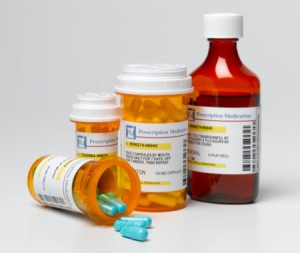Prescription Drug Use Among Youth
With every generation that passes, a new way to get high starts to trend among youth.
According to the Community Anti-Drug Coalitions of America’s (CADCA) Teen Medicine Abuse Fact Sheet, recent trends show an increase in prescription and over-the-counter (OTC) drug misuse among the youth. There is a low perception of risk among the youth surrounding drug use – they believe that getting medicines from home makes them safer.
When used appropriately, prescription drugs can benefit the individual that is using them. If misused these drugs can be extremely harmful and sometimes deadly. The most commonly misused prescription medications include:
- Prescription Opioids [such as Vicodin and OxyContin]
- Opioids are a class of drug typically used for pain management – however, when misused both can lead to an overdose
- Some signs of an overdose are slowed breathing, discolored skin, unconsciousness, limp muscles, gurgling sounds
- Find more opioid facts HERE
- Benzodiazepines [such as Valium, Klonopin, Xanax]
- Benzodiazepines can be addictive are most commonly used to treat anxiety, alcohol withdrawal, muscle spasms, and sleeplessness
- Common side effects of benzo use are drowsiness, memory impairment, lightheadedness, vomiting, constipation, and dry mouth
- Signs that you may be experiencing an overdose due to benzo use include clammy skin, dilated pupils, coma, shallow breathing, and a rapid weak pulse
- Prescription Stimulants [such as Adderall and Ritalin]
- Stimulants increase the brain’s level of dopamine and norepinephrine for help with focus, memory, motivation, and attentiveness
- Some signs of stimulant misuse can be nausea, vomiting, loss of appetite, dry mouth, irritability, trouble sleeping, and upset stomach
- Find more stimulant facts HERE
Pay attention to behavior changes in the young people in your life because some may be related to substance use. Some signs to look for when a young person is misusing substances are:
- Withdrawing from family and friends, wants more alone time
- Loss of interest in hobbies and activities
- Hostile, angry, and aggressive behaviors when someone tries to control their actions
- Crying for little to no reason and irritability
- No longer caring about appearances
- Quality of schoolwork and grades start to decrease
- Sleep patterns are off
- No longer caring about family rules
Actions steps for how adults can prevent prescription medicine misuse in teens:
- Talk to your teen about prescription misuse – make sure they understand the risks
- Take actionable steps to prevent medication misuse at home – lock medications and dispose of unused medications
- Doctor prescribing a new medication? Ask them about misuse potential and signs of overdose
- Educate others about what you know – talk with other parents and adults in your community
- Speak up and be a leading voice at school meetings, sports events, community events and other gatherings with fellow parents
Preventing substance misuse is the key to keeping our youth safe. Prevention needs to begin in the home.
Sources:
Signs and Symptoms of Prescription Drug Use (narconon.org)
Benzodiazepines vs. Barbiturates: Addiction & Side Effects (medicinenet.com)


